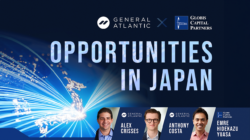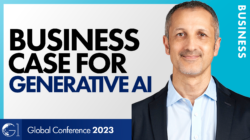Leading High Performing Remote Teams
How can leaders ensure that performance remains high in remote or hybrid-work environments?
Content Marketing
In this course, you’ll learn how compelling blogs, videos, podcasts, and other media can reach customers and drive sales. You’ll also learn steps for creating an effective content marketing plan, and some important ways to measure its impact and success.
Content marketing is a essential digital marketing strategy for companies looking to provide relevant and useful information to support your community and attract new customers.
Get started on your content marketing journey today.
Sustainable Innovation in Times of Disruption: Choices for a Better Society
There are opportunities for progress all around us. The key is to innovate on these opportunities sustainably.
To help identify most effective path forward, you'll need to gain a global perspective to these challenges in an open discussion. How can Japan and the world take action to create a more sustainable, innovative world? Where do you fit in?
It's time to find out.
Social Media & Digital Communications: Impact on Global Public Opinion
Social and digital media have dominated the communications industry for decades. But it's no secret that social media has the power to sway public opinion, and the way in which many companies use these platforms could be seen as manipulative.
What do companies need to be aware of when utilizing social and digital media? How can these mediums be used to better communicate strategically with the world?
Discover what top media and communications experts have to say.
CAGE Distance Framework
Want to expand overseas? The CAGE distance framework can help ensure you're constructing a solid global strategy in four areas: cultural, administrative, economic, and geographic. Learn how to leverage useful differences between countries, identify potential obstacles, and achieve global business success.
Servant Leadership
There's more to leadership than driving a team to profit. In fact, there's a word for looking beyond self-interest to prioritize individual growth: servant leadership. Try this course for a quick breakdown of what that is, how it works, and how it can lead to organizational success.
Strategy: Creating Value Inside Your Company
Have you ever wondered why certain companies are more successful than others? The answer is strategy: internal processes that control costs, allocate resources, and create value. This course from GLOBIS Unlimited can give you the tools you need for that strategic edge.
Strategy: Understanding the External Environment
To plan strategy on any level, you need to understand your company's external environment. In fact, your level of understanding can impact hiring, budgeting, marketing, or nearly any other part of the business world. Want to learn how to do all that? This course from GLOBIS Unlimited is the perfect first step!
Using Japanese Values to Thrive in Global Business
Japanese companies have unique cultural, communication, and operational challenges. But they also have values that have led to remarkable longevity. Check out this seminar to hear how these values help earn trust from overseas head offices and develop employees.
Marketing: Reaching Your Target
Every company works hard to get its products into the hands of customers. Are you doing everything you can to compete? In this course, you’ll find a winning formula to turn a product idea into real sales. Follow along through the fundamentals of the marketing mix and see how companies successfully bring products to market.
Basic Accounting: Financial Analysis
Want to compare your performance vs. a competitor? Or evaluate a potential vendor? Then you'll need to conduct a financial analysis. This course will teach you how to use three financial statements and evaluate financial performance in terms of profitability, efficiency, soundness, growth, and overall strength.
Career Anchors
What drives you to be good at your job?
Career anchors are based on your values, desires, motivations, and abilities. They are the immovable parts of your professional self-image that guide you throughout your career journey.
Try this short GLOBIS Unlimited course to identify which of the eight career anchors is yours!
Leadership with Passion through Kokorozashi
The key ingredient to success? Passion.
Finding your kokorozashi will unify your passions and skills to create positive change in society. This GLOBIS Unlimited course will help you develop the values and lifelong goals you need to become a strong, passion-driven leader.
When envisioning a career in a sustainable industry, it’s easy to get lost in the idea that a whole new set of qualifications will be required. However, every company needs the basics of IT support, HR, accounting etc. For example, knowledge of and training in finance are especially versatile skills, allowing you to easily transition into a role that is both professionally and personally fulfilling.
In this course, Bruno Rauis explains the financial models and concepts he uses in the solar industry. Coming previously from a banking background, he dove headfirst into the world of renewable energy and hasn’t looked back since.
What is Your Current Role?
Bruno Rauis: My name is Bruno Rauis. I’m the structuring lead at a company called Candi Solar. Candi is a company that is developing, installing, and financing solar systems for commercial and industrial clients in India and in South Africa.
Structuring means that I’m involved in the design and execution of both the products that we contract with clients or the financing arrangements we give to clients as well as the financing arrangements. The money that we borrow from banks and other types of lenders.
So if you are a company and want to, as we say in the jargon in our industry, “go solar”, which means essentially you replace the electricity you buy from the grid and generate it from solar systems. There are different models that you might consider. The easiest way to categorize them is to think about it in terms of what we call, again in our industry, CapEx or OpEx.
What’s the Difference Between CapEx and OpEx?
Capital Expenditure
Rauis: CapEx is a model where as a company you buy a solar system and install it in your premises and it’s called CapEx because for you it represents, in accounting terms, a capital expenditure. So it’s a CapEx model. You buy a solar system, you put it on your roof or on your land adjacent to your premises and maybe you get a loan from the bank and you repay the loan. But essentially it’s your system and nobody’s really getting involved other than the person (the developer) who builds the system. That’s one way of doing it. It has advantages and disadvantages.
Operational Expenditure
Rauis: Another way of doing it is what we call the OpEx. And OpEx here stands for “operational expenditure” and that’s the system. That’s the model that we can engage most in. Not exclusively. We do a bit of CapEx as well, but mostly we do what we call OpEx. And here the idea is slightly different. The idea is that a company like Candi would come and build a solar system on your premises, right? As I said, on your roof or on your land and we would connect it to your building. So if you’re an industrial client, you know, maybe you have a factory and we will connect it to your factory, but it’s not your system per se, right?
CapEx: High Investment, High Reward
Rauis: So it’s Candi system. It’s our system. And we would agree with you, with your company, that for every unit of electricity that’s generated from the system, you would pay a certain tariff, right? So instead of paying the tariff to your utility, to your electricity company, the kilowatt hour that’s generated by the solar system, you pay a tariff to Candi. And this because you don’t make the capital expenditure. It’s not your system. Every kilowatt hour that you pay the tariff on is an operational expenditure and that’s what we call it an OpEx model.
OpEx: Little Investment, High Savings
Rauis: Now I would say the main advantage, what we perceive as the main advantage, of the OpEx model is that essentially as a user of electricity, of renewable electricity, you don’t have to worry about anything. We come with the system, it’s our system, and you just buy the electricity, which it depends where you are in the world and it depends on various factors.
But certainly the countries we are involved in, the electricity for the solar system from the solar system is cheaper than the electricity you buy from the from the electricity company. So from your perspective, you pay nothing to begin with and you save as soon as it’s installed.
Aligning Over Clean Energy
Rauis: And you also have the benefit of having clean energy if that’s something you care about or maybe your investors care about. It’s a model that is really neat and works really well. Because there is also an alignment of interest between the company using the electricity and the developer who’s owning the system because both parties really want the system to generate as much electricity as possible. Right? Because the developer earns revenues based on how much the system performs and the user saves on its electricity bill, you know, depending on how much the system performs, right? So both parties are aligned in their interest.


